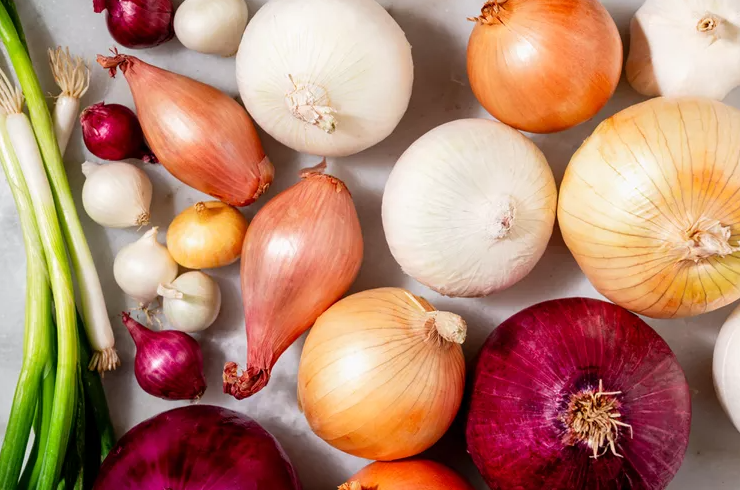Onions are more than just a flavorful addition to meals—they are a powerhouse of nutrients with exceptional health benefits. From fighting cancer to improving heart health and lowering cholesterol, onions have been used for centuries in natural medicine. This article delves deep into the science-backed benefits of onions, their role in disease prevention, and how you can incorporate them into your daily diet.
What Makes Onions a Superfood?
Onions belong to the Allium family, alongside garlic, shallots, and leeks. They contain bioactive compounds like flavonoids, sulfur compounds, and antioxidants that contribute to their impressive health benefits. Their strong anti-inflammatory and antimicrobial properties make them a vital component in natural healing.
Health Benefits of Onions
1. Onions and Cancer Prevention
Onions have been extensively studied for their cancer-fighting properties. Their high content of quercetin, a potent antioxidant, and organosulfur compounds help reduce the risk of various cancers.
How Onions Fight Cancer:
- Colon Cancer: Studies suggest that consuming onions regularly may lower the risk of colorectal cancer by promoting gut health and reducing inflammation.
- Stomach Cancer: The sulfur compounds in onions can help inhibit the growth of Helicobacter pylori, a bacterium linked to stomach cancer.
- Breast Cancer: The flavonoids in onions exhibit anti-carcinogenic effects by preventing the multiplication of cancer cells.
- Lung and Prostate Cancer: Onions’ antioxidant properties help neutralize free radicals that contribute to cancer growth.
2. Onions for Heart Health

Heart disease remains a leading cause of death worldwide, and onions offer multiple benefits in protecting cardiovascular health.
How Onions Support the Heart:
- Lowering Blood Pressure: Onions help relax blood vessels and improve circulation, reducing hypertension.
- Reducing Bad Cholesterol (LDL): Onions can lower LDL cholesterol while boosting HDL (good) cholesterol, minimizing the risk of heart attacks.
- Preventing Blood Clots: The sulfur compounds in onions have natural blood-thinning properties that prevent clot formation.
- Reducing Inflammation: Chronic inflammation is a major contributor to heart disease, and onions help combat this with their anti-inflammatory effects.
3. Onions and Cholesterol Management
High cholesterol levels contribute to heart disease, stroke, and other cardiovascular conditions. Onions play a significant role in cholesterol regulation.
- Quercetin in Onions: This powerful antioxidant helps reduce LDL cholesterol while preventing oxidative stress.
- Boosting Good Cholesterol (HDL): Consuming onions regularly can increase HDL levels, which protect arteries.
- Supporting Weight Loss: Since obesity is linked to high cholesterol, onions’ fiber content aids digestion and weight control.
4. Onions and Diabetes Management
Onions help regulate blood sugar levels and improve insulin sensitivity, making them an excellent dietary choice for diabetics.
- Lowering Blood Sugar: The sulfur compounds in onions improve insulin function and glucose metabolism.
- Reducing Insulin Resistance: Onions help cells use insulin more efficiently, preventing blood sugar spikes.
5. Onions for a Strong Immune System
A strong immune system is crucial for fighting infections, and onions offer natural immune-boosting properties.
- Rich in Vitamin C: This essential vitamin enhances white blood cell production and immune defense.
- Antibacterial and Antiviral Effects: Onions combat bacteria, viruses, and fungi that cause infections.
- Reducing Cold and Flu Symptoms: Onion tea or extracts can help relieve congestion and sore throats.
6. Onions and Digestive Health
A healthy gut contributes to overall well-being, and onions support digestion and gut microbiota balance.
- Rich in Prebiotics: Onions contain inulin and fructooligosaccharides, which feed good gut bacteria.
- Preventing Constipation: High fiber content in onions promotes regular bowel movements.
- Reducing Stomach Inflammation: The anti-inflammatory properties of onions help soothe gastritis and stomach ulcers.
7. Onions for Bone Strength
Onions contribute to stronger bones and may help prevent osteoporosis, particularly in postmenopausal women.
- Increasing Bone Density: Regular onion consumption has been linked to higher bone density.
- Reducing Bone Loss: Onion compounds help protect against bone deterioration.
8. Onions for Skin and Hair Health
Onions are rich in antioxidants and sulfur, making them beneficial for both skin and hair care.
- Reducing Acne and Skin Infections: Onion extracts have antimicrobial effects that fight acne-causing bacteria.
- Enhancing Hair Growth: Sulfur compounds in onions stimulate hair follicles and improve scalp health.
- Preventing Premature Aging: Onions’ antioxidants help combat skin aging and wrinkles.
How to Buy, Store, and Use Onions
Buying the Best Onions
When selecting onions, look for:
- Firm and dry outer skins
- No soft spots or signs of sprouting
- A strong, pungent smell (indicating freshness)
Proper Storage Methods
- Whole Onions: Store in a cool, dry place with good air circulation. Avoid refrigerating whole onions.
- Cut Onions: Store in an airtight container in the refrigerator and use within a few days.
- Preserving Onions: You can freeze chopped onions for future use in cooking.
Ways to Incorporate Onions into Your Diet
- Raw: Add to salads, sandwiches, and salsas for a crunchy, spicy flavor.
- Cooked: Sauté onions with garlic for a flavorful base in soups, stews, and stir-fries.
- Roasted or Grilled: Enhances sweetness and depth of flavor.
- Onion Juice: Used as a natural remedy for hair and skin health.
Who Should Avoid Onions?
While onions offer numerous health benefits, some individuals should consume them with caution.
People Who Should Limit Onion Intake
- Individuals with Acid Reflux: Onions can trigger heartburn and acid reflux in some people.
- People with Irritable Bowel Syndrome (IBS): Onions contain fermentable carbohydrates that may cause bloating and discomfort.
- Those with Onion Allergies: Symptoms may include skin irritation, stomach discomfort, or breathing issues.
- Individuals Taking Blood-Thinning Medications: Since onions have natural blood-thinning properties, excessive intake may interfere with medications.
Final Thoughts: Why You Should Add Onions to Your Diet
Onions are a nutritional powerhouse that provides protection against cancer, heart disease, diabetes, and more. Their antioxidant-rich composition, coupled with their antimicrobial and anti-inflammatory properties, makes them an essential superfood.

